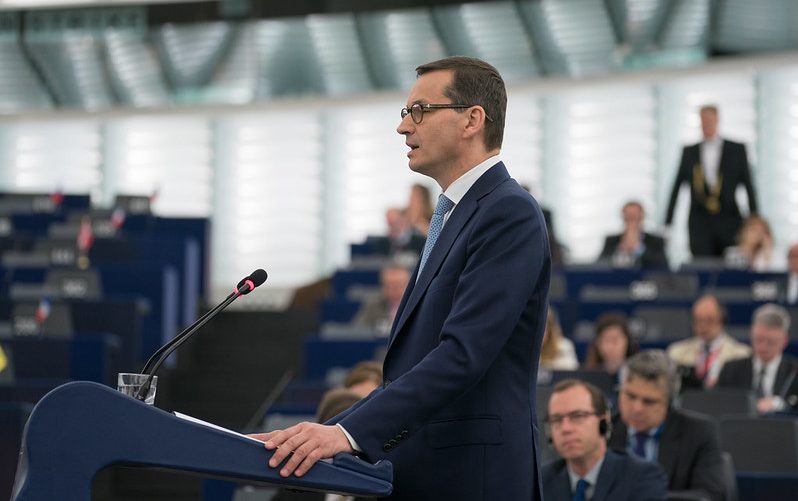On the 23rd of November, the European Parliament denied Mateusz Morawiecki the opportunity to make a statement during a debate about the current situation on the Belarusian border (Rzeczpospolita, 2021). According to various sources, multiple members of the European Parliament have expressed their disapproval of using the European stage as a ‘way to address one’s own electorate and succeed in their own political agenda’ (Szymańska-Borginon, 2021), which was considered to be the case during Morawiecki’s previous speech in October, organised concerning the rule of law in Poland (Majmurek, 2021).
The decision of the European Parliament can be interpreted as a sign from the EU that Poland, on a larger political scene, is no longer considered a reliable and serious debating partner, with whom solutions to ongoing issues can be communally discussed. This behavioural pattern has previously been adopted by both Angela Merkel and Emmanuel Macron, who have, to the great criticism of the Polish government, spoken directly to both Vladimir Putin and Alexander Lukashenko about the situation on the EU border to Belarus, without inviting or even considering the Polish government (deutschland.de, 2021).
Even though it is unsurprising that being omitted in conflict resolution debates, especially ones touching Poland directly, is a sign of disregard to both Morawiecki and his ruling, rightwing conservative PiS party, it is understandable that the current Polish government is considered not only an untrustworthy cooperation partner but also a body of power completely unable to safeguard the security of its citizens and lead a proactive, strategic and future-oriented political plan. It is understandable because, even if we disregard the larger political conflict the PiS party has with the EU, the Polish government has proven incapable of independently analysing, anticipating or reacting collaboratively to international political developments. This can be clearly seen by tracing the chronology of events from this year, which have contributed to the deteriorating relations with Belarus and the EU and which Poland could have, on multiple occasions, taken control of (Burzyńska, Stankiewicz, 2021).
The chain of events started in May of 2021, when Roman Protasevich, a Belarusian political activist and author of the telegram channel Nexta, was arrested after the Belarusian authorities diverted his Ryanair flight to Minsk under the excuse of a false bomb threat (Kokot, 2021). Just two years earlier, in 2019, Poland denied Protasevich’s asylum, which he asked for after the arrest of his colleague Vladimir Chudentsov, the creator of Nexta (Grekowicz, 2021). Already the sole act of the detainment of opposition activists made by the Lukashenko regime would have been a sufficient reason to raise the alarm in its neighbouring countries. However, the fact that Poland had already been made aware of the threat two years beforehand and yet showed little desire for an international response was a sign of negligence.
Another significant event, underestimated by the Polish political scene, was the reaction of Lukashenko to the EU’s resolution to tighten sanctions with Belarus. These sanctions were imposed on the country after the presidential elections of the previous year and were extended after the arrest of Protasevich (Dobrinsky, 2021). In response, the Belarusian government suspended the decision made in January of 2020 to readmit illegal immigrants, which cross into the EU through the Belarusian border (tvn24.pl, 2021). Lukashenko also made the decision to halt the country’s membership in the Eastern Partnership Initiative (Moliński, 2021). This unfriendly response should have been confronted for multiple reasons including the fact that Poland is positioned of the outer, eastern-most border of the EU, which is currently presenting itself as a complicated issue, and the fact that the use of sanctions elicited a hostile rather than remediating reaction, potentially foreshadowing future political relations.
In addition to that, the Belarusian authorities have made multiple attempts to endanger the security of Polish citizens by threatening to cut gas deliveries along the Jamal-Europe pipeline (money.pl, 2021), being accused by the former Belarusian ambassador Pavel Latushko of taking part in the hacking of Michal Dworczyk’s (the chief of Chancellery) personal emails to spread disinformation about Poland and its government (Kazimierczuk, 2021) and participating in Zapad, a military exercise camp organised by Russia, which this year took place closer to the western border of Belarus and ‘featured largely the scenario of a coalition of NATO states intervening in Belarus to conduct regime change and wrest a part of the country away’ (Kofman, 2021).
What is even more disappointing is that during this entire year, when so many opportunities for collaboration with EU countries in order to address the issues with Belarus presented themselves, the Polish government was occupying itself with decreasing women’s rights, starting a conflict with Czechia regarding Turow mine, fighting with the EU about the rule of law, claiming the EU laws are incompatible with Polish constitution, partaking in corruption scandals and creating inadequate policies that are to deal with the Coronavirus crisis and its economic repercussions (Madejski, 2021). Therefore, even though it is disheartening for an average polish citizen to see that a representative of our country is denied access to a very important debate on international politics, it is perhaps an event to consider in future elections.
Sources Burzyńska, A. and Stankiewicz, A., 2021. Stan po Burzy: #116 – Gniew Kaczyńskiego przeraził Łukaszenkę, Kurski poluje na Morawieckiego, sojusz PiS-u z foliarzami. [online] Podcastyonet.net.libsyn.com. Available at <https://podcastyonet.net.libsyn.com/show/stanpoburzy/116-gniew-kaczyskiego-przeraziukaszenk-kurski-poluje-na-morawieckiego-sojusz-pis-u-z-foliarzami> [Accessed 28 November 2021]. deutschland.de, 2021. Merkel rozmawia z Łukaszenką o sytuacji na zewnętrznej granicy Unii Europejskiej. [online] https://www.deutschland.de/pl/news/merkel-rozmawia-z-lukaszenkao-sytuacji-na-zewnetrznej-granicy-unii-europejskiej. Available at:<https://www.deutschland.de/pl/news/merkel-rozmawia-z-lukaszenka-o-sytuacji-nazewnetrznej-granicy-unii-europejskiej> [Accessed 28 November 2021]. Dobrinsky, R., 2021. New EU sanctions against Belarus: What will be their economic effect? (news article). [online] wiiw.ac.at. Available at: <https://wiiw.ac.at/new-eu-sanctionsagainst-belarus-what-will-be-their-economic-effect-n-513.html> [Accessed 28 November 2021]. Grekowicz, N., 2021. Polska nie dała azylu Romanowi Protasiewiczowi – ujawniają nam bliscy białoruskiego dziennikarza. [online] oko.press. Available at: <https://oko.press/romanprotasiewicz-bez-azylu/> [Accessed 28 November 2021]. Kazimierczuk, A., 2021. Białoruski opozycjonista o “ataku na ministra Dworczyka”. [online] Rzeczpospolita. Available at: <https://www.rp.pl/swiat/art8566691-bialoruskiopozycjonista-o-ataku-na-ministra-dworczyka> [Accessed 28 November 2021]. Kofman, M., 2021. Zapad 2021: What We Learned From Russia’s Massive Military Drills – The Moscow Times. [online] The Moscow Times. Available at: <https://www.themoscowtimes.com/2021/09/23/zapad-2021-what-we-learned-fromrussias-massive-military-drills-a75127> [Accessed 28 November 2021]. Kokot, M., 2021. Polska odm wi a azylu Romanowi Protasiewiczowi. [online] gazetapl. Available at: <https://wyborcza.pl/7,75399,27123460,polska-odmowila-azylu-romanowiprotasiewiczowi.html> [Accessed 28 November 2021]. Madejski, M., 2021. Tarcza antyinflacyjna wzrostu cen nie pokona. Tyle w 2022 r. zapłacimy za prąd, gaz i benzynę. [online] Business Insider. Available at: <https://businessinsider.com.pl/gospodarka/tarcza-inflacyjna-tyle-polak-zaplaci-w-2022-rza-prad-gaz-i-benzyne/bprgfq9> [Accessed 28 November 2021]. Majmurek, J., 2021. Po debacie w europarlamencie: Polska ma przyjaciół już tylko an skrajnej prawicy. [online] KrytykaPolityczna.pl. Available at: <https://krytykapolityczna.pl/swiat/ue/morawiecki-ue-polska-parlament-europejski-tsue/>[Accessed 28 November 2021]. Moliński, D., 2021. Bia oru zawiesza udzia w Partnerstwie Wschodnim i odwo uje ambasadora UE. “Kolejny krok wstecz”. [online] nextgazetapl. Available at: <https://next.gazeta.pl/next/7,151003,27263301,bialorus-zawiesza-udzial-w-partnerstwiewschodnim-i-odwoluje.html> [Accessed 28 November 2021]. money.pl, 2021. Wstrzymanie dostaw gazu? “Polska jest gotowa”. [online] www.money.pl. Available at: <https://www.money.pl/gospodarka/wstrzymanie-dostaw-gazu-polska-jest-gotowa-6705726213667808a.html> [Accessed 28 November 2021]. Rzeczpospolita, 2021. PE odmówił Morawieckiemu wystąpienia w czasie debaty o Białorusi. [online] Rzeczpospolita. Available at: <https://www.rp.pl/dyplomacja/art19128291-peodmowil-morawieckiemu-wystapienia-w-czasie-debaty-o-bialorusi> [Accessed 28 November 2021]. Szymańska-Borginon, K., 2021. PE odmawia Morawieckiemu wystąpienia podczas debate. [online] Rmf24.pl. Available at: <https://www.rmf24.pl/raporty/raport-stanwyjatkowy/news-pe-odmowil-premierowi-morawieckiemu-wystapienia-podczasdeba, nId,5663241#crp_state=1> [Accessed 28 November 2021]. tvn24.pl, 2021. Białoruś zawiesza umowę o readmisji z Unią Europejską. Łukaszenka podpisał ustawę. [online] TVN24. Available at: <https://tvn24.pl/swiat/bialorus-zawieszonoumowe-o-readmisji-z-unia-europejska-5452031> [Accessed 28 November 2021].








Be First to Comment